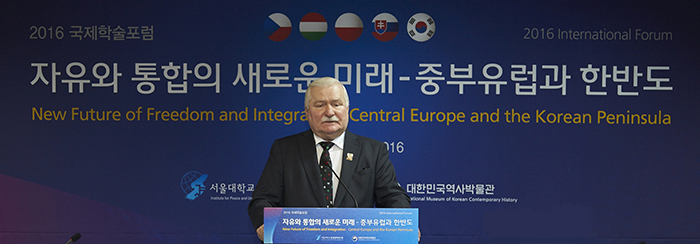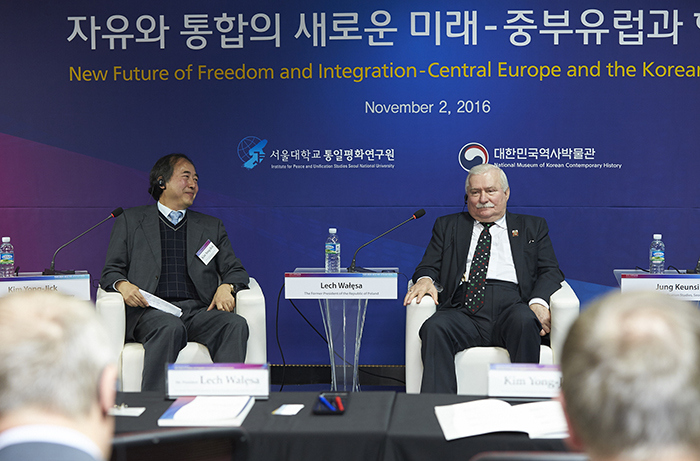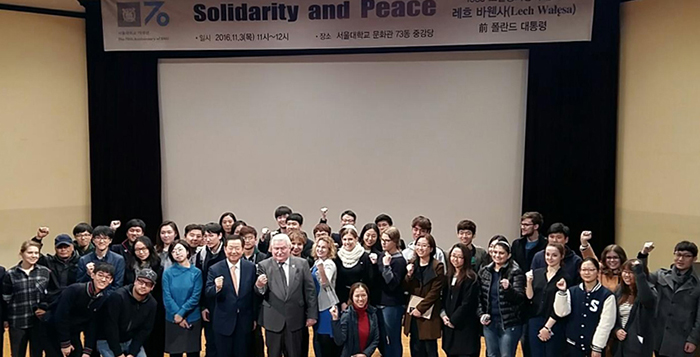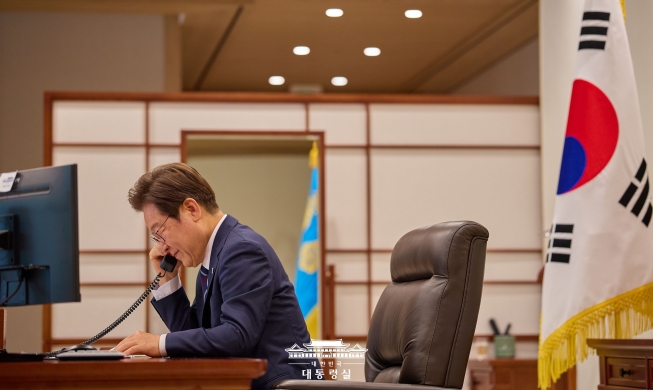“I hope to see the unification of the Korean Peninsula come in the next 10 years. Korea should come up with long-term strategies that can muster cooperation from neighboring countries before it wants to achieve a unified Korea, rather than opt to become a lone hero.”
So said Nobel Peace Prize-recipient and former Polish President Lech Walesa at an international forum at the National Museum of Korean Contemporary History in Seoul on Nov. 2. The theme of the forum was “New Future of Freedom and Integration: Central Europe and the Korean Peninsula.”


The former Polish president arrived in Seoul on Nov. 1 to attend the forum. It has been 13 years since his past visit to Korea. When asked about why he had come to Korea, Walesa said, “I wanted to talk about what’s really important to achieve peace and prosperity across the peninsula.”
The Nov. 2 forum shed new light onto the historical transitions experienced by four central European countries: Poland, Czechia, Hungary and Slovakia. They went through the collapse of the socialist regimes and the achievement of democracy. What the four nations learned from such history can give a series of lessons to Korea, which is in the process of achieving unification on the peninsula.
“One of roles that our generation should take is to build a structure where countries from around the world could tear down the boundaries and cooperate with each other to find solutions,” said the former Polish leader in his keynote speech. “We need to give thought to how we can establish such a structure and to how we can draw upon such mutual cooperation.”
What’s most important in forming solidarity among individuals in this modern society, he said, is to take advantage of advanced technologies and to have confidence in our heart.
“Technological advancement has changed the way we live, and taking advantage of this technology can drive more people to unite as one. Given what I’ve gone through, it’s imperative for individuals to enhance their solidarity by sharing their own values. Without any trust or confidence in each other, there would surely be conflicts and limitations that could get in the way of what they have to achieve together,” he stressed.

The next day, his message rang out again during a special lecture he gave at Seoul National University on Nov. 3.
“We should have confidence in our minds that the two Koreas will be unified in the end. Also, we should find ways to achieve that goal through solidarity,” said Walesa. “It’s important that South Korea maintain its own line of conduct, but what’s more important is that it should keep in mind that other countries from around the world can help out, too,” he said.
He wrapped up by saying that, “Thirteen years ago, in 2003, when I visited South Korea, I thought that the next time I come back I would witness a unified Korea, which I don’t see now, sadly. I wish I could come back to One Korea in my lifetime.”
Working as a mechanic and then as an electrician at a shipbuilding yard, the young Walesa founded the Solidarity Trade Union in the 1980s, the Soviet bloc’s first independent trade union. It led the democratic movement against the socialist regime. He has been credited for paving the way for democracy beyond Poland and across Eastern Europe. He won the Nobel Peace Prize in 1983 in recognition of his good deeds. In 1990, he was elected president of Poland. Since his presidential term ended, Walesa has engaged in peace campaigns around the world.
By Sohn JiAe
Korea.net Staff Writer
Photos: National Museum of Korean Contemporary History, Yonhap News
jiae5853@korea.kr
So said Nobel Peace Prize-recipient and former Polish President Lech Walesa at an international forum at the National Museum of Korean Contemporary History in Seoul on Nov. 2. The theme of the forum was “New Future of Freedom and Integration: Central Europe and the Korean Peninsula.”

Poland's Lech Walesa gives a speech titled “A Great Leap Toward Freedom and Peace,” during an international forum at the National Museum of Korean Contemporary History in Seoul on Nov. 2.

Director of the National Museum of Korean Contemporary History Kim Yong-jick (left) and former Polish President Lech Walesa shares their insights on how Poland gained its freedom during an international forum in Seoul on Nov. 2.
The former Polish president arrived in Seoul on Nov. 1 to attend the forum. It has been 13 years since his past visit to Korea. When asked about why he had come to Korea, Walesa said, “I wanted to talk about what’s really important to achieve peace and prosperity across the peninsula.”
The Nov. 2 forum shed new light onto the historical transitions experienced by four central European countries: Poland, Czechia, Hungary and Slovakia. They went through the collapse of the socialist regimes and the achievement of democracy. What the four nations learned from such history can give a series of lessons to Korea, which is in the process of achieving unification on the peninsula.
“One of roles that our generation should take is to build a structure where countries from around the world could tear down the boundaries and cooperate with each other to find solutions,” said the former Polish leader in his keynote speech. “We need to give thought to how we can establish such a structure and to how we can draw upon such mutual cooperation.”
What’s most important in forming solidarity among individuals in this modern society, he said, is to take advantage of advanced technologies and to have confidence in our heart.
“Technological advancement has changed the way we live, and taking advantage of this technology can drive more people to unite as one. Given what I’ve gone through, it’s imperative for individuals to enhance their solidarity by sharing their own values. Without any trust or confidence in each other, there would surely be conflicts and limitations that could get in the way of what they have to achieve together,” he stressed.

Former Polish President Lech Walesa (front row, sixth from left) poses for a group photo with a group of students following his lecture at Seoul National University on Nov. 3.
The next day, his message rang out again during a special lecture he gave at Seoul National University on Nov. 3.
“We should have confidence in our minds that the two Koreas will be unified in the end. Also, we should find ways to achieve that goal through solidarity,” said Walesa. “It’s important that South Korea maintain its own line of conduct, but what’s more important is that it should keep in mind that other countries from around the world can help out, too,” he said.
He wrapped up by saying that, “Thirteen years ago, in 2003, when I visited South Korea, I thought that the next time I come back I would witness a unified Korea, which I don’t see now, sadly. I wish I could come back to One Korea in my lifetime.”
Working as a mechanic and then as an electrician at a shipbuilding yard, the young Walesa founded the Solidarity Trade Union in the 1980s, the Soviet bloc’s first independent trade union. It led the democratic movement against the socialist regime. He has been credited for paving the way for democracy beyond Poland and across Eastern Europe. He won the Nobel Peace Prize in 1983 in recognition of his good deeds. In 1990, he was elected president of Poland. Since his presidential term ended, Walesa has engaged in peace campaigns around the world.
By Sohn JiAe
Korea.net Staff Writer
Photos: National Museum of Korean Contemporary History, Yonhap News
jiae5853@korea.kr
